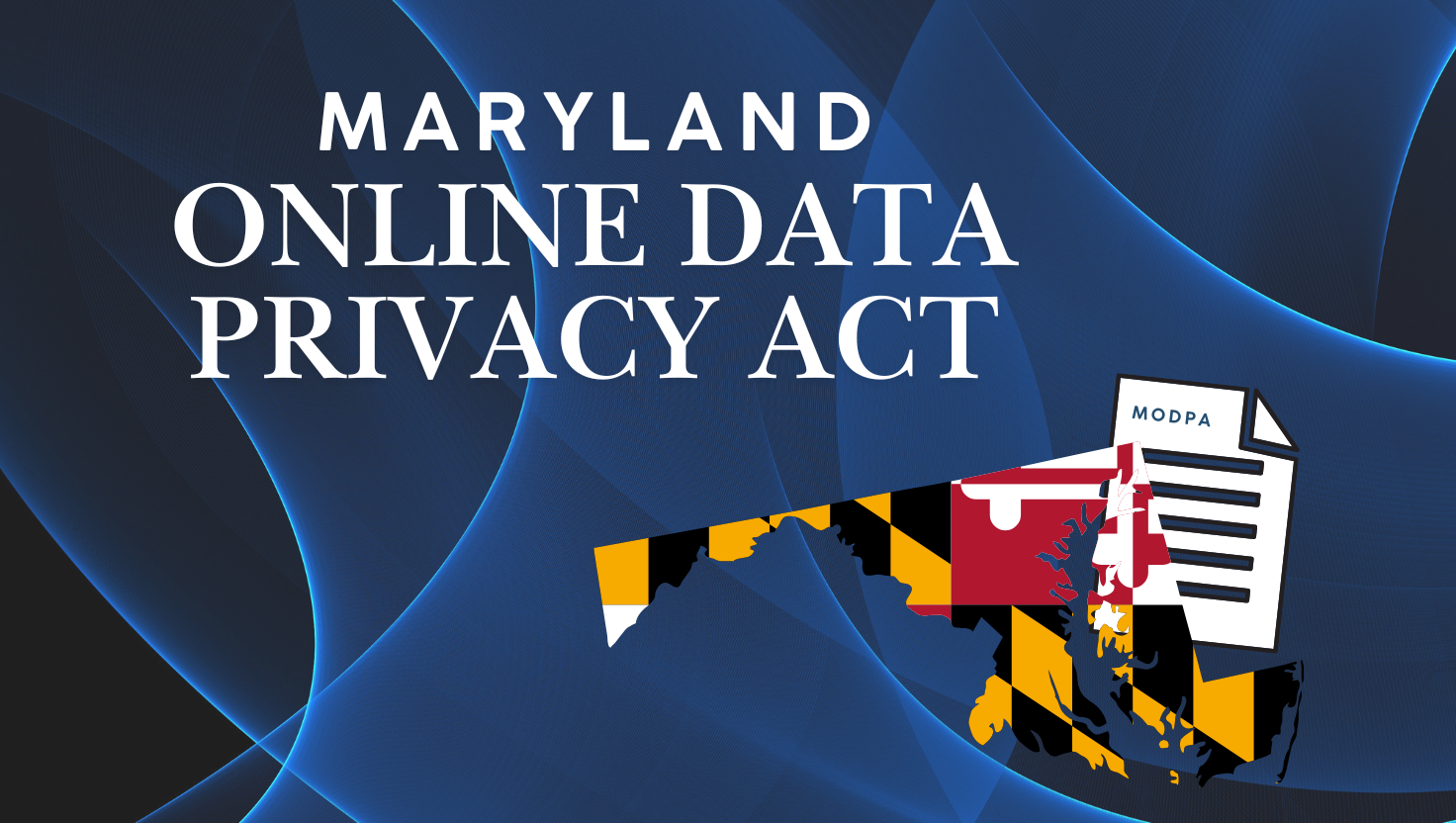What is the Maryland Online Data Privacy Act and How Will It Affect Businesses?

The Maryland Online Data Privacy Act (MODPA) creates new standards for how businesses collect, process, and protect personal data of Maryland consumers. Effective October 1, 2025, businesses will face significant changes in data handling and compliance requirements. This article breaks down what is the Maryland Online Data Privacy Act and how it will affect businesses in practical terms.
Understanding the Maryland Online Data Privacy Act (MODPA)
The Maryland Online Data Privacy Act (MODPA) represents a advancement in setting new benchmarks for the protection of data privacy. Enacted on May 9, 2024, with an effective date of October 1, 2025, MODPA is designed to oversee business activities related to the accumulation, handling and utilization of consumer’s personal data. It provides Maryland residents with essential rights that enable them to access their information, make corrections where necessary, delete it if desired, and have a say over how their data is managed.
MODPA imposes more stringent requirements than many current state data privacy laws, indicating a move toward enhanced protections for consumers’ personal information within Maryland. The legislation ensures consumers have greater authority over their own personal details while mandating businesses follow rigorous standards pertaining to how they process such information.
A key element of MODPA lies in its emphasis on safeguarding consumer rights, particularly regarding sensitive personal data treatment like biometric data, which are subject to additional controls. This act allows individuals not only to review, correct or erase their stored digital footprints, but also places constraints around data processing, thereby bolstering online security for inhabitants across state lines.
Key Provisions of MODPA
MODPA enacts several critical measures aimed at strengthening the protection of consumer data privacy. To begin with, Maryland residents have the right to obtain access to their personal data held by businesses. This empowers individuals to request information regarding the personal data a business possesses about them and acquire a copy of said data.
Consumers are granted the right to rectify any inaccuracies within their personal data and mandate its erasure, subject to certain conditions. They may also insist that their information not be shared or employed for targeted advertising purposes without explicit approval.
MODPA requires businesses to limit their collection and use of personal data only to what is strictly necessary to provide the service the customer asked for, and they are not allowed to collect or control any other personal data beyond that. The precept of “data minimization” obligates companies only to gather and utilize essential pieces of biometric or genetic personal details necessary for service provision and justifiable reasons must support such collection.
Under MODPA, businesses must get clear permission from individuals before using or sharing sensitive personal data. Selling this type of data is generally banned unless it’s absolutely necessary, and in those cases, the business must document and show how they’re following the rules when handling people’s data.
Who Needs to Comply with MODPA?
The Maryland Online Data Privacy Act (MODPA) encompasses a variety of businesses, though not universally. It is applicable to entities engaged in the processing of personal data pertaining to over 35,000 consumers within Maryland or those who manage personal information from at least 10,000 state residents and derive upward of 20% of their revenue through the sale of that data. Such criteria are designed to encompass enterprises substantially involved with handling data related to individuals in Maryland.
MODPA’s reach extends beyond local operations to incorporate any organization conducting business within the state or deliberately targeting services toward individuals residing in Maryland. Consequently, companies situated outside the borders of Maryland but catering services toward its inhabitants are required to adhere to MODPA regulations.
Under this act’s provisions, “consumer” refers explicitly to natural persons who hold residency status in Maryland. As such, MODPA provides comprehensive and strong safeguards for these residents’ personal data protection rights.
Impact on Business Operations
The launch of MODPA is set to make a considerable mark on corporate functions, compelling transformations in diverse facets of data management and manipulation. Enterprises are required to reform their practices in order to be consistent with the provisions of MODPA, achieving adherence by the stipulated enforcement date of October 1, 2025. Among these significant alterations will be the adoption of an all-encompassing opt-out feature for users that businesses need to incorporate starting on April 1, 2026.
It’s vital for enterprises to grasp which specific segments will undergo changes due to MODPA. Affected areas include revamping procedures related to handling data, revising privacy disclosures and putting into place definitive mechanisms for consumer opt-outs. Subsequent sections provide comprehensive instructions on adhering to these fresh mandates.
Data Processing Changes
MODPA stresses the importance of data minimization and purpose limitation, mandating that companies restrict their gathering and utilization of personal data to only what is essential for delivering the precise service a consumer has sought. Consequently, enterprises must rigorously scrutinize their data processing activities and put in place appropriate strategies to guarantee adherence to these core principles.
Firms are obligated to perform assessments regarding the impact on data protection for internet-based services that children are likely to use. Such evaluations play a vital role in pinpointing and diminishing hazards related to those services. By conducting these assessments, businesses ensure they manage personal data with responsibility while aligning with the stipulations prescribed by MODPA.
Privacy Notices and Consumer Rights
Under the provisions of MODPA, it is mandatory for companies to disseminate privacy notices that are both comprehensible and readily accessible. These documents should detail the specific types of personal data being collected, the reasons behind its collection, and identify which categories of this information are shared with external entities. Such transparency measures aim at making consumers fully aware of how their personal details are managed.
Individuals reserve the right to gain access to their own personal data held by these businesses, rectify any errors within it, as well as request erasure of any unwanted records. Companies must amend their privacy policies accordingly to encompass these privileges and provide explicit guidance on how individuals can avail themselves of these rights. Particular emphasis is placed on ensuring firms furnish a comprehensive list delineating all third-party agents who have received consumers’ private data.
Opt-Out Mechanisms
MODPA requires companies to give customers distinct choices to decline both the sale of their personal data and its use for targeted advertising. This obligation includes the placement of an unmistakable opt-out link on company websites as well as adherence to universal opt-out signals beginning October 25, 2025. These provisions are intended to simplify consumers’ ability to manage the utilization of their personal information.
By offering these options for opting out, businesses can bolster consumer confidence and demonstrate a strong commitment to safeguarding data privacy. To comply with regulations and foster good relationships with customers, it’s imperative that these mechanisms be both accessible and straightforward in design.
Enhanced Data Security Measures
Under the MODPA, companies are obligated to establish strong security protocols for safeguarding personal data. This involves limiting access to such data strictly to individuals who have proper authorization and implementing verification procedures to block any unauthorized entry. Such precautions are crucial in preserving the confidentiality of consumers’ sensitive information while also adhering to MODPA regulations.
Data Protection Assessments
Under the MODPA framework, companies are required to undertake assessments for data protection when dealing with activities related to processing sensitive information that may carry an increased potential for consumer harm. These evaluations aim at weighing both positive outcomes and possible risks associated with such data processing tasks, promoting a forward-thinking strategy in pinpointing and addressing likely security issues.
Penalties for Non-Compliance
Companies that do not adhere to the requirements of MODPA may be subject to substantial sanctions, with monetary fines reaching up to $10,000 per occurrence and escalating to $25,000 for instances of multiple infractions. The responsibility for overseeing compliance with MODPA lies with the Consumer Protection Division under the Maryland Attorney General’s office. This body holds the power both to levy these fines and pursue additional legal actions against violators.
Under MODPA regulations, businesses are granted a 60-day window known as a “cure period” during which they can rectify any findings before escalated legal measures are enforced. This two-month grace period offers enterprises a chance to resolve areas where they fall short in adherence so that they can sidestep potentially hefty penalties.
Preparing for MODPA Compliance
Companies must carefully evaluate their current data handling procedures to identify areas falling short of MODPA’s expectations and make necessary adjustments to align with its rigorous criteria. To properly prepare, businesses should adopt proactive, strategic measures over time to facilitate ongoing adherence to MODPA regulations.
Steps to Take Now
Companies ought to initiate training initiatives for their workforce focusing on the proper management of personal data and consumer rights as mandated by MODPA. Such education guarantees that employees comprehend the novel stipulations and are adept at dealing with personal data in adherence to the statute. Training programs centered on data security measures are also important for safeguarding consumer information.
It is equally important for businesses to revise their privacy policies so they align with MODPA’s stipulations, guaranteeing that all activities related to data processing conform with these updated rules. Through these preliminary measures, companies can embark on a path towards achieving complete compliance with MODPA.
Long-Term Compliance Strategies
To ensure enduring adherence, it is essential to establish a durable data governance structure that coincides with the stipulations of MODPA. Such a framework should incorporate continual training for employees on practices regarding data privacy and persistent oversight of compliance to accommodate shifts in regulations.
How Hartman Supports Businesses in Achieving Compliance
Hartman Executive Advisors provides comprehensive services to assist companies in achieving and maintaining compliance with MODPA standards. Our compliance assessments thoroughly evaluate your current risk profile to identify any gaps in alignment with cybersecurity, privacy, and governance requirements. We conduct regulatory readiness evaluations and gap analyses to align your security measures with standards like NIST, HIPAA, SOX, and emerging laws such as MODPA.
Hartman’s risk management experts also help craft a robust cybersecurity strategy and manage risks associated with external parties, ensuring your business manages your cybersecurity risk. Our services include ongoing compliance monitoring and audit preparation, equipping your team with the necessary tools and knowledge for successful evaluations.
By partnering with Hartman, businesses will not only meet MODPA requirements, but also cultivate a corporate approach to data privacy.
Achieve MODPA Compliance Today
The Maryland Online Data Privacy Act (MODPA) represents a pivotal advancement in fortifying consumer data privacy protections. Businesses must adapt their operational practices to comply with MODPA’s stringent requirements, which encompass revising data processing activities, updating privacy notices, and enhancing opt-out mechanisms. Preparing for these obligations involves immediate actions and strategic long-term planning to ensure sustained compliance.
With the effective date of October 1, 2025, approaching swiftly, it is crucial for companies to prioritize consumer data privacy and implement decisive measures to meet MODPA standards. By adopting a proactive stance, businesses can build consumer trust, avoid penalties, and adeptly navigate the evolving landscape of data privacy regulations. Contact Hartman today for an assessment of your current data practices and to get on the road to MODPA compliance.


